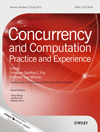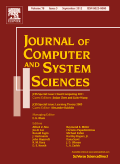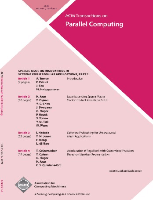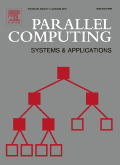
DISTRIBUTED COMPUTING
Scope & Guideline
Transforming Ideas into Distributed Solutions
Introduction
Aims and Scopes
- Distributed Algorithms:
Research that explores the design, analysis, and implementation of algorithms that operate in distributed systems, focusing on efficiency and effectiveness in problem-solving. - Fault Tolerance and Byzantine Agreement:
Studies related to achieving consensus and reliability in the presence of failures, particularly in environments with malicious actors, emphasizing Byzantine fault tolerance. - Network Models and Communication Complexity:
Investigations into the properties of various network models, including the CONGEST model, and the complexities associated with communication in distributed settings. - Distributed Data Structures and Synchronization:
Development and analysis of data structures that can be efficiently utilized in distributed systems, including issues of synchronization and consistency. - Self-Stabilization and Dynamic Systems:
Research on systems that can recover from transient faults or changes in their environment, focusing on self-stabilizing protocols and algorithms. - Graph Algorithms in Distributed Settings:
Exploration of distributed algorithms for solving graph-related problems, including connectivity, coloring, and minimum spanning tree issues in various network topologies. - Cloud Computing and Resource Management:
Studies that integrate distributed computing principles with cloud computing, focusing on resource allocation, load balancing, and scalability.
Trending and Emerging
- Byzantine Consensus and Resilience:
A marked increase in research related to Byzantine consensus protocols highlights the growing importance of resilience in distributed systems, especially in the context of security and fault tolerance. - Self-Stabilizing and Adaptive Algorithms:
Emerging studies on self-stabilizing algorithms that adapt to changes in system state or network topology are gaining traction, showcasing a trend towards systems that can autonomously recover from faults. - Resource Allocation in Cloud and Edge Computing:
Research focusing on distributed computation within cloud and edge environments is trending, driven by the need for efficient resource management and scalability in modern computing infrastructures. - Asynchronous Communication Models:
The exploration of asynchronous communication models is on the rise, providing new insights into how distributed systems can operate effectively without relying on synchronized states. - Social Network Dynamics and Distributed Systems:
An emerging theme involves the study of opinion dynamics and information spread in social networks, linking distributed computing with social phenomena and complex systems.
Declining or Waning
- Traditional Synchronization Mechanisms:
Research focused on classical synchronization techniques, such as locks and semaphores, appears to be diminishing as more researchers explore lock-free and wait-free algorithms that enhance performance in distributed systems. - Static Network Models:
The interest in static network models is waning as the focus shifts towards dynamic and adaptive networks that better reflect real-world scenarios, including mobile and heterogeneous environments. - Basic Consensus Protocols:
While consensus remains a critical area, the basic consensus protocols are less frequently explored as researchers look to improve upon these fundamentals with more complex and optimized solutions, particularly in Byzantine contexts. - Locality-Based Algorithms:
The focus on locality in distributed algorithms is declining, as researchers increasingly consider global approaches that leverage the entire network rather than relying solely on localized interactions. - Single-Threaded Distributed Computation:
There is a noticeable decrease in research dedicated to single-threaded approaches in distributed systems, with a growing emphasis on parallel and concurrent processing techniques.
Similar Journals

CONCURRENCY AND COMPUTATION-PRACTICE & EXPERIENCE
Elevating Academic Discourse in ComputingCONCURRENCY AND COMPUTATION-PRACTICE & EXPERIENCE, published by Wiley in the United Kingdom, serves as a pivotal platform for advancing research and innovation in the fields of computational theory, computer networks, and practical applications of computer science. With an impressive impact factor and recognition in the Q2 category for disciplines such as Computational Theory and Mathematics, this journal attracts a diverse range of scholarly articles that address the current challenges and developments in these areas. It boasts a comprehensive viewership with options for Open Access, enabling wide dissemination of knowledge. Indexed by Scopus with notable rankings in multiple categories, including a remarkable position in Computational Theory and Mathematics (Rank #41/176), the journal not only elevates academic discourse but also fosters collaboration among researchers, professionals, and students alike. As it progresses toward its 2024 milestone, CONCURRENCY AND COMPUTATION-PRACTICE & EXPERIENCE remains dedicated to publishing high-quality research that prepares its readership for the evolving technological landscape.

JOURNAL OF COMPUTER AND SYSTEM SCIENCES
Pioneering insights in computer science and systems analysis.The Journal of Computer and System Sciences is a distinguished publication founded in 1967 and continually striving to push the boundaries of knowledge in computer science and applied mathematics. Published by Academic Press Inc, Elsevier Science, this journal boasts impressive credentials, holding a Q1 quartile ranking across multiple categories including Applied Mathematics, Computational Theory and Mathematics, Computer Networks and Communications, and Theoretical Computer Science as of 2023. With a focus on innovative research and comprehensive theoretical developments, this journal serves as a pivotal forum for authors and readers alike, facilitating cutting-edge contributions to the field. The journal is not currently open access, providing a curated selection of high-quality articles for its subscription residents. By engaging with this journal, researchers, professionals, and students can gain insight into the latest trends, prominent methodologies, and significant findings that shape the modern landscape of computing and systems analysis.

Journal of Grid Computing
Illuminating Trends in Computer Networks and ArchitectureThe Journal of Grid Computing, published by Springer, stands as a pivotal resource in the dynamic field of computer science, particularly within the realms of Computer Networks and Communications, Hardware and Architecture, Information Systems, and Software. With an impressive Q1 ranking across these categories in 2023, the journal exemplifies excellence and rigor, catering to a diverse readership from researchers to industry professionals. Established in 2003, this esteemed journal is anchored in the Netherlands and releases cutting-edge research that reflects trends and advancements in grid computing technologies. Researchers can gain insights through its vast contributions, while institutions benefit from its prestigious standing within the SCOPUS framework, boasting high percentile ranks in multiple computer science categories. Though not open access, the journal provides unparalleled access options for institutional subscribers, solidifying its importance as a gateway to innovative discoveries in high-performance distributed computing.

Multiagent and Grid Systems
Connecting Scholars and Practitioners in Multiagent TechnologyMultiagent and Grid Systems is a cutting-edge academic journal published by IOS PRESS that delves into the dynamic realms of computer science, particularly focusing on multi-agent systems and grid computing. Since its inception in 2005, the journal has provided a vital platform for researchers and practitioners in the field, showcasing innovative studies that explore the integration and application of multiagent technology within grid systems. With an impact factor that marks it as a noteworthy contributor, Multiagent and Grid Systems currently holds a Q3 ranking in the Computer Science (Miscellaneous) category, reflecting its contributions to advancing knowledge and practice in this interdisciplinary domain. The journal aims to disseminate high-quality research and foster collaboration among scholars and industry professionals, encouraging novel approaches and solutions to complex computational challenges. Although it is not an open-access journal, it remains an essential resource for anyone looking to stay abreast of the latest developments in this rapidly evolving field.

Science China-Information Sciences
Pioneering Knowledge in the Evolving Landscape of Information Sciences.Science China-Information Sciences is a prestigious academic journal published by SCIENCE PRESS, dedicated to advancing knowledge in the field of information sciences and computer science. Established in China, the journal has gained a remarkable reputation, with a 2023 category quartile ranking of Q1 in Computer Science (miscellaneous) and an impressive Scopus rank of #16 out of 232 in General Computer Science, positioning it within the 93rd percentile. The journal embraces a broad spectrum of topics, from theoretical frameworks to practical applications, providing a platform for researchers, professionals, and students to disseminate their findings and engage with the latest advancements in the field. With open access options available, Science China-Information Sciences ensures that innovative research is accessible to a global audience, fostering collaboration and interdisciplinary dialogue. The journal not only reflects the evolving landscape of information sciences but also plays a pivotal role in shaping future research directions.

ACM Transactions on Parallel Computing
Connecting Ideas in Parallel ComputingACM Transactions on Parallel Computing (ISSN: 2329-4949; E-ISSN: 2329-4957), published by the Association for Computing Machinery, stands as a pivotal journal in the field of computer science, particularly focusing on the advancements in parallel and distributed computing. With its convergence years spanning from 2014 to 2024, this journal serves as a significant platform for disseminating cutting-edge research, methodologies, and technologies that shape the future of computational theory, hardware architectures, and effective software solutions. Although it currently holds a Q3 category ranking in various subfields including Computational Theory and Mathematics, and Modeling and Simulation, it continues to attract researchers aiming to contribute to its growing impact in the field. The journal's commitment to fostering knowledge exchange makes it an essential resource for professionals and students eager to navigate the complexities of parallel computing. As the field evolves, ACM Transactions on Parallel Computing remains a critical reference point for innovative research and professional development in computer science.

Theoretical Computer Science
Unraveling the Mysteries of Theoretical Computer ScienceTheoretical Computer Science, published by Elsevier, serves as a pivotal platform in the field of computational theory, exploring the foundational aspects of computer science and mathematical logic since its inception in 1975. With both a print ISSN of 0304-3975 and an E-ISSN of 1879-2294, this journal is esteemed for its rigorous peer-review process and commitment to advancing knowledge in theoretical frameworks and algorithms. Positioned in the Q2 quartile for both Computer Science (miscellaneous) and Theoretical Computer Science categories, it ranks #124 out of 232 in general computer science and #73 out of 130 in theoretical computer science according to Scopus metrics, reflecting its significant influence and reach within the academic community. Researchers and professionals can access this journal through institutional subscriptions, providing a plethora of high-quality articles that contribute to ongoing debates and developments in the discipline. The journal's scope encompasses a wide array of topics, ensuring relevance across various subfields, thus making it an essential resource for anyone dedicated to furthering their understanding of theoretical computer science.

PARALLEL COMPUTING
Fostering Collaboration in Cutting-Edge Computational Research.PARALLEL COMPUTING is a premier academic journal dedicated to advancing research in the dynamic and rapidly evolving field of parallel and distributed computing. Published by Elsevier, this journal has been at the forefront of technological advancements since its inception in 1984, engaging a global audience and fostering a rich dialogue among researchers and practitioners alike. With an impressive impact factor that reflects its relevance in the academic community, PARALLEL COMPUTING is currently categorized in multiple fields, including Artificial Intelligence (Q3), Computer Graphics and Computer-Aided Design (Q2), and others, highlighting its multidisciplinary scope. As a vital resource, the journal features cutting-edge research articles, reviews, and methodologies that drive innovation across various domains such as hardware architecture, software engineering, and theoretical computer science. Although it does not offer open access, the journal's traditional publication model ensures rigorous peer review and high scholarly standards. Researchers, professionals, and students are encouraged to engage with the latest findings and contribute to the journal's commitment to excellence in parallel computing.

International Journal of Advanced Computer Science and Applications
Fostering Collaboration for Tomorrow’s Tech Solutions.International Journal of Advanced Computer Science and Applications, published by SCIENCE & INFORMATION SAI ORGANIZATION LTD, stands as a significant platform in the ever-evolving field of computer science. With its ISSN 2158-107X and E-ISSN 2156-5570, the journal aims to disseminate high-quality research and innovations from diverse areas within computer science, embracing cutting-edge technologies and methodologies. As of 2023, it holds a commendable Q3 ranking in the field, placing it among a competitive cohort of journals while showcasing its commitment to scholarly excellence. The journal operates under an open access model, ensuring that its content is widely accessible to researchers, professionals, and students alike, thereby fostering a collaborative environment for knowledge-sharing and advancing the discipline. With a history of converged contributions from 2017 to 2024, the International Journal of Advanced Computer Science and Applications serves as a vital resource for those seeking to stay at the forefront of computer science research and applications.

DISTRIBUTED AND PARALLEL DATABASES
Advancing the Frontiers of Database InnovationDistributed and Parallel Databases is a prestigious journal published by Springer, dedicated to advancing the field of database systems and distributed computing. With an ISSN of 0926-8782 and an E-ISSN of 1573-7578, this journal has been a prominent platform for disseminating significant research findings since its inception in 1993. The journal is recognized for its contributions across various dimensions of database technology, notably reflecting in its 2023 Quartile Rankings where it stands at Q3 in Hardware and Architecture and Software, while achieving a commendable Q2 in Information Systems and Management. With Scopus Ranking positioning it within the top half of key categories, the journal plays a crucial role in bridging theoretical and practical aspects of distributed database solutions. Although it does not currently offer open access options, it is widely accessible to institutions, making it an essential resource for researchers, professionals, and students keen on exploring the latest trends and innovations in the realm of distributed and parallel computing.